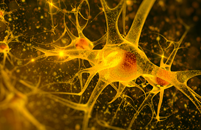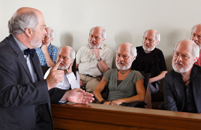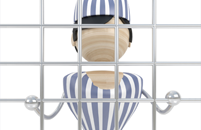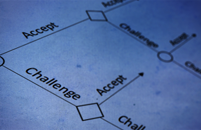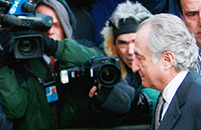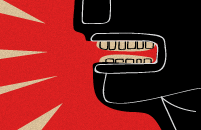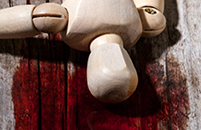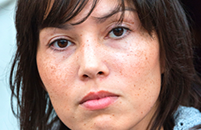Articles by Category
Articles by Issue
Recent Comments
- Stephen Brodsky on Harming Children: Uncovering and Overcoming Bias When Defending Sex Crimes Against Children
- Laura on Courtroom Attire: Ensuring Witness Attire Makes the Right Statement
- Members selection — Court-Martial Trial Practice Blog — February 22, 2014 on Why Do We Ask Jurors To Promise That They Will Do the Impossible?
- Video: Pryor Greed and Lawyers | Parents Rights Blog on Ethical Issues in Racial Profiling
- On the relationship between ideological and demographic diversity on Inaccuracy in Political Self-Perception: Young Adults Are Not as Conservative as They Believe
- Taylor Bishop on Tips for Preparing the Expert Witness
- Thanks for stopping by…. « The Jury Room on Book Review- Social Media as Evidence: Cases, Practice Pointers, and Techniques
- Thanks for stopping by…. « The Jury Room on Book Review: The Juror Factor: Race and Gender in America’s Civil Courts
Case Preparation and Presentation Archive
-
If It Feels Bad to Me, It’s Wrong for You: The Role of Emotions in Evaluating Harmful Acts
by Ivar Hannikainen, Ph.D. and Ryan Miller and Fiery Cushman, Ph.D.Posted on August 20, 2014 | No CommentsAuthored by Ivar Hannikainen, Ryan Miller and Fiery Cushman with responses from Ken Broda-Bahm and Alison Bennett, this article has a lesson for us all. It isn’t what that terrible, awful defendant did that makes me want to punish, it’s how I think I would feel if I did that sort of terrible, horrible awful thing. That’s what makes me want to punish you. It’s an interesting perspective when we consider what makes jurors determine lesser or greater punishment. -
Neuroimagery and the Jury
by Jillian M. Ware and Jessica L. Jones and N.J. Schweitzer, Ph.D.Posted on August 20, 2014 | 2 CommentsAuthored by Jillian M. Ware, Jessica L. Jones, and Nick Schweitzer with responses from Ekaterina Pivovarova and Stanley L. Brodsky, Adam Shniderman, and Ron Bullis. Remember how fearful everyone was about the CSI Effect when the research on the ‘pretty pictures’ of neuroimagery came out? In the past few years, several pieces of research have sought to replicate and extend the early findings. These studies, however, failed to find support for the idea that neuroimages unduly influence jurors. This overview catches us up on the literature with provocative ideas as to where neurolaw is now. -
Predicting Jurors’ Verdict Preference from Behavioral Mimicry
by Matthew Groebe, Ph.D. and Garold Stasser, Ph.D. and Kevin-Khristián Cosgriff-Hernandez, M.A.Posted on August 20, 2014 | 13 CommentsAuthored by Matthew Groebe, Garold Stasser, and Kevin-Khristián Cosgriff-Hernandez, this paper gives insight into how jurors may be leaning in support of one side or the other at various points during the trial. This is a project completed using data from actual mock trials (and not the ubiquitous undergraduate). -
Novel Defenses in the Courtroom
by Shelby Forsythe and Monica K. Miller, J.D., Ph.D.Posted on August 20, 2014 | 1 CommentAuthored by Shelby Forsythe and Monica K. Miller, with a response from Richard Gabriel. This article examines the reactions of research participants to a number of novel defenses (Amnesia, Post-Traumatic Stress Disorder (PTSD), Battered Women Syndrome (BWS), Multiple Personality Disorder (MPD), Post-Partum Depression (PPD), and Gay Panic Defense) and makes recommendations on how (as well as whether or not) to use these defenses. -
On The Application of Game Theory in Jury Selection
by David Caditz, Ph.D.Posted on August 20, 2014 | 2 CommentsAuthored by David M. Caditz with responses from Roy Futterman and Edward Schwartz. Suppose there was a more predictable, accurate and efficient way of exercising your peremptory strikes? Like using a computer model based on game theory? In this article, a physicist presents his thoughts on making those final decisions more logical and rational and based on the moves opposing counsel is likely to make. -
Moving From Hapless to Hapful with the Problem Defendant
by Bronwen Lichtenstein, PhD. and Stanley L. Brodsky, Ph.D.Posted on May 7, 2014 | 4 CommentsYou might think of this as a recommendation to modify your client's "visual identity"--at least for trial. -
Are Lab Studies on PTP Generalizable?: An Examination of PTP effects Using a Shadow Jury Paradigm
by Tarika Daftary-Kapur, Ph.D. and Steven Penrod, Ph.D. and Maureen O'Connor, J.D., Ph.D.Posted on May 7, 2014 | No CommentsA new study showing (gasp) that PTP really DOES effect juror decision-making. You want to read this. -
Beware of the Tricks Used to Encourage a Witness to Volunteer
by Merrie Jo Pitera, Ph.D.Posted on May 7, 2014 | 8 Comments"Hey! This opposing counsel is really nice and we have things in common!" Helping your witness NOT fall for that old shtick. -
The Emotional Components of Moral Outrage and their Effect on Mock Juror Verdicts
by Liana Peter-Hagene, MA and Alexander Jay, BA and Jessica Salerno, PhDPosted on May 7, 2014 | 11 Comments"Seeing or hearing that just makes me morally outraged!" And moral outrage makes jurors more likely to vote guilty according to this research. -
Women as Expert Witnesses
by Michelle A. Jones, M.A., J.D. and Tess M.S. Neal, Ph.D.Posted on May 7, 2014 | 5 CommentsHere's an update on how women expert witnesses fare compared to male expert witnesses. Some good news. Some not so good news. Make sure your knowledge is current.

